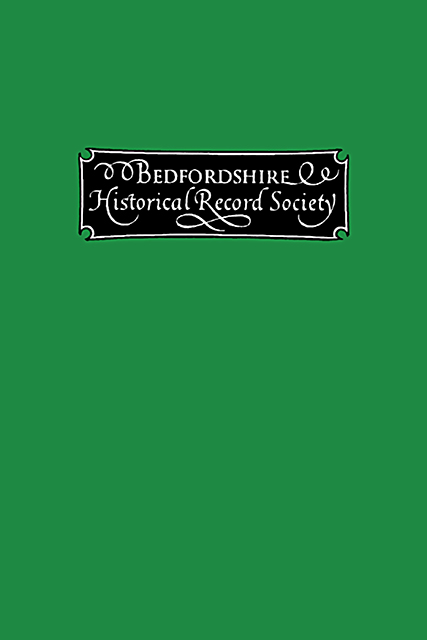Book contents
- Frontmatter
- Symbols and Abbreviations
- Contents
- General Note
- John Harvey of Ickwell, 1688-9
- Edmond and Christian Williamson of Husborne Crawley, 1709-20
- Henry Taylor of Pulloxhill, 1750-72
- John Salusbury of Leighton Buzzard, 1757-9
- John Pedley of Great Barford, 1773-95
- Elizabeth Brown of Ampthill, 1778-91
- Edward Arpin of Felmersham, 1763-1831
- Catherine Young (later, Maclear) of Bedford, 1832-5 and 1846
- Sir John Burgoyne of Sutton, 1854
- Major J. H. Brooks and the Indian Mutiny, 1857
- The Rev. G. D. Newbolt of Souldrop, 1856-95
- Some Letters from Bedfordshire Pioneers in Australia, 1842-86
- Index Nominorum et Locorum
- Index Rerum
- Miscellaneous Endmatter
Sir John Burgoyne of Sutton, 1854
Published online by Cambridge University Press: 14 July 2023
- Frontmatter
- Symbols and Abbreviations
- Contents
- General Note
- John Harvey of Ickwell, 1688-9
- Edmond and Christian Williamson of Husborne Crawley, 1709-20
- Henry Taylor of Pulloxhill, 1750-72
- John Salusbury of Leighton Buzzard, 1757-9
- John Pedley of Great Barford, 1773-95
- Elizabeth Brown of Ampthill, 1778-91
- Edward Arpin of Felmersham, 1763-1831
- Catherine Young (later, Maclear) of Bedford, 1832-5 and 1846
- Sir John Burgoyne of Sutton, 1854
- Major J. H. Brooks and the Indian Mutiny, 1857
- The Rev. G. D. Newbolt of Souldrop, 1856-95
- Some Letters from Bedfordshire Pioneers in Australia, 1842-86
- Index Nominorum et Locorum
- Index Rerum
- Miscellaneous Endmatter
Summary
Introduction
The Diary presented here was kept by John Montagu Burgoyne during the early part of the Crimean War. It was deposited in the County Record Office (X 143) in 1947 by Major C. E. M. Ellison, M.C., by whose kindness we are allowed to publish it. A few letters to Burgoyne’s mother have survived and, although it is not possible to publish them at this time, one of them, written at sea off Tenedos on the 6th November, 1854, is worth quoting. Burgoyne writes : “I am glad to see the Times is hustling the medical authorities—indeed they want it. 40 unprotected females have now arrived and are a regular subject of ridicule. The very commonest medicines and appliances are wanting, & men are dying by scores for want of them.”
Sir John Montagu Burgoyne, tenth Baronet, was born in 1832, educated at Eton and, entering the Grenadier Guards in 1850, became Lieutenant and Captain in 1851. He was severely wounded at the Battle of the Alma and invalided home. He succeeded to the baronetcy on the death of his father, Colonel Sir John Montagu Burgoyne, in 1858. In 1860 he was promoted Captain and Lt. Colonel, but retired the following year and lived at Sutton Park, Sandy, Bedfordshire, which his ancestor, Thomas Burgoyne, had acquired in 1554.
Burgoyne was a Magistrate, Deputy-Lieutenant and, in 1868, High Sheriff of Bedfordshire, besides commanding the Bedfordshire Militia, whose history he wrote.
He had the reputation of being an outspoken man, though even those who least agreed with him gave him credit for the best intentions, and he was regarded in the county with great respect.
One episode in Burgoyne’s later life deserves a word. In 1870 his yacht, the Gazelle, was in Deauville and the Empress Eugenie’s doctor came aboard and asked Burgoyne to take her to England. He agreed at once, but fortunately suggested that she should not come aboard until midnight, for at 11 p.m. the French police came aboard and searched the yacht. When in 1903 Burgoyne married for the second time, the Empress gave gave him a silver tea and coffee service, and in her will she left him a painting by Greuze “In remembrance of the chivalrous way he came to my assistance”.
- Type
- Chapter
- Information
- Some Bedfordshire Diaries , pp. 163 - 186Publisher: Boydell & BrewerFirst published in: 2023



